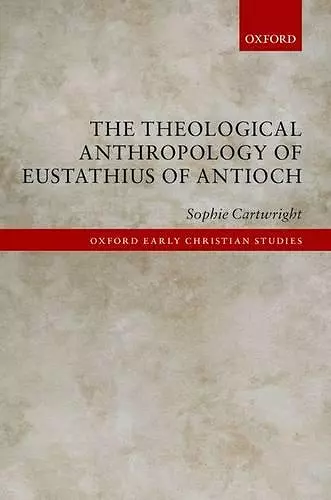The Theological Anthropology of Eustathius of Antioch
Format:Hardback
Publisher:Oxford University Press
Published:1st Oct '15
Currently unavailable, and unfortunately no date known when it will be back

This authoritative study explores Eustathius of Antioch's theological anthropology, offering insight into one of the most important thinkers of the early Arian controversy. Sophie Cartwright situates Eustathius' thought in relation to the early 'Arian' controversy, the Constaninian Revolution, the theological legacies of Irenaeus and Origen, and the philosophical commentary tradition. She also locates Eustathius within his historical context and provides a detailed overview of the sources for his complex and fragmented corpus. Eustathius' anthropology is indebted to a tradition shaped by the theology of Irenaeus, that had already come into conversation with Origen. Dr Cartwright suggests that Origen's own thought was indebted to Irenaeus but that he had a radically different cosmology; this shaped subsequent engagement with both thinkers. Eustathius' theology of embodiment draws on Irenaeus, in opposition to what he perceives as the Origenist and Platonist anthropology which, in his anti-Arian works, he associates with Eusebius of Caesarea. However, he is deeply indebted to Origen for his doctrine of Christ's human soul and, consequently, his wider psychology. He places humanity at a great distance from God and seeks to give humanity autonomous value, especially in his discourse on God's image. This represents one logical negotiation of the rejection of Origen's eternal intelligible world. Eustathius' divisive Christology offers a picture of Christ as the perfect human being that echoes Irenaeus' Adam-Christ typology, fleshed out by an Origenian discourse on Christ's human soul and infused with a keen awareness of the chasm between God and humankind. He proffers a doctrine of inherited sinfulness as an alternative to Origen's doctrine of the fall and looks to a corporeal eschatological kingdom ruled over by the human Christ; this eschatology probably reflects discomfiture with Constantine's role in the church.
a remarkable achievement. By meticulously explicating the fragments of Eustathius through wide-ranging contextualization, she has provided us with the most illuminating reconstruction of his theological system to date ... Accordingly, Eustathius's broadly conceived theological-anthropological concerns, so expertly reconstructed by Cartwright, considerably enrich and "thicken" our understanding of this decisive period of theological development. * Mark DelCogliano, Journal of Religion *
This book represents a major contribution to patristic studies that should be read by all scholars interested in the Greek theology of the fourth and fifth centuries. * Kelley Spoert, Zeitschrift für Antikes Christentum *
ISBN: 9780198744559
Dimensions: 241mm x 171mm x 23mm
Weight: 618g
294 pages